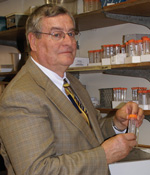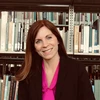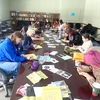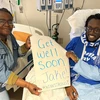Rarely is this subject material taught in a seminar format at the undergraduate level at schools the size of SUNY Fredonia. With heavy emphasis on interaction between student and professor, Cancer Biology is vastly different from any other course offered here, Ms. Astry explained. “There is a great deal of independent work expected of the students. They are required to read 20 research articles and interpret and respond to them. They are expected to give formal and informal presentations, and to think creatively about the subject of cancer therapy, and actively participate in small-group discussions.”
|
SUNY Fredonia is providing an exceptional opportunity this semester for a handful of select students to learn about cancer biology from Dr. John Baust, one of the world’s leading researchers in cryobiology, a branch of biology that studies how extremely low temperatures can be used to treat diseases.
Eight students are enrolled in a Special Studies class,"Cancer Biology," which is being led by Dr. Baust, with assistance from SUNY Fredonia professors Patricia Astry, Theodore Lee and Wayne Yunghans.
A professor of Biology, director of the Institute for Biomedical Technology at SUNY Binghamton and adjunct professor of Surgery at the Medical College of Houston, Dr. Baust has pioneered the development of cryotechniques to successfully treat cancer, among other diseases.
No stranger to this campus, Dr. Baust received his undergraduate degree in Biology from SUNY Fredonia in 1965 and returned last year to speak to students in classes and also give two seminars. His doctorate, also in Biology, was awarded at the University of Alaska-Fairbanks.
“It was great,” Ms. Astry, assistant professor of Biology, department chair and director of the Medical Technology Program, said of the inaugural Aug. 24 class with Dr. Baust. Rarely is this subject material taught in a seminar format at the undergraduate level at schools the size of SUNY Fredonia.
“The students had an amazing opportunity to listen to a well-known, distinguished scientist who is on the cutting edge of the utilization of cryotherapy for the treatment of cancer,” Ms. Astry explained. Treating prostate cancer is the focus of Dr. Baust’s current research.
With heavy emphasis on interaction between student and professor, Cancer Biology is vastly different from any other course offered here, Ms. Astry explained. “There is a great deal of independent work expected of the students. They are required to read 20 research articles and interpret and respond to them. They are expected to give formal and informal presentations, and to think creatively about the subject of cancer therapy, and actively participate in small-group discussions.”
Divided into three sections, the course began with an examination of Dr. Baust’s cryoablation research. The second is devoted to team presentations and group discussions that examine the cellular/molecular basis of a cancer’s response to stress. Students will give mini-presentations on work they’ve done during the seminar and also outline strategies that could constitute an effective form of cancer therapy in the final section.
Dr. Baust will lead two additional class sessions, both in October, and additionally participate in three November webinars, utilizing distance-learning facilities to link SUNY Fredonia and SUNY Binghamton campuses.
“He is going to listen to the students who are giving formal presentations on assigned topics and engage them in follow-up discussions, give them constructive criticism on their presentations,” Ms. Astry said. “They will have group discussions, and he will essentially moderate them. It will be very interactive between faculty and students.”
Widely regarded as the highlight of the course is a weekend visit to Dr. Baust’s laboratory at SUNY Binghamton, where Fredonia students will engage in informal discussions with Dr. Baust’s graduate students, perform lab work and meet staff members of his biotechnology company. They will also be exposed to cellular and molecular techniques and equipment, two topics contained in assigned course readings.
Competition for seats in this class was highly competitive, according to Ms. Astry, and students had to prepare applications to be considered. “They understand the magnitude of who this person is and the importance of his work,” she said. “They feel privileged to be part of the course.”
Students grab opportunity
These 10 seniors intend to continue their education in health or medical fields beyond SUNY Fredonia in either professional or graduate schools. Several were so impressed by guest lectures Dr. Baust gave here last year that they immediately seized the opportunity to vie for a seat in this class.
“At first I was assuming the talks would be way above my head, but Dr. Baust has a real talent for knowing how to speak to an audience. He certainly has a craft for writing papers, but he also knows how to present information to a group in a manner that surely benefits his research and allows the audience to get into the material,” biology major Julie M. Graham, a 2006 graduate of Elmira Free Academy, said of a Dr. Baust lecture she heard last year.
“It’s intriguing to hear someone who is so knowledgeable and is working on actual treatments to battle (cancer) speak on a down-to-earth level with students who are not in his laboratory or even at his university,” Ms. Graham said.
Another classmate echoed a similar observation. “The way he presented information was so intriguing that I just wanted to hear more,” said Josh Jacobs, a 2006 graduate of Batavia High School. “I also felt this would be a good opportunity to be exposed to a professional field of study while still here at Fredonia since I have always thought that the best doctor was one who was versed in a plethora of knowledge.”
Though they are charting different career paths -- Ms. Graham plans to become a pharmacist and Mr. Jacobs a dentist – both praise Dr. Baust for giving them a firmly grounded perspective into patient care and understanding, in addition to the science.
Seeing the afflictions of some of her future clients and having an understanding of the biological and biochemical aspects of what they are receiving relating to their medications is appealing to Ms. Graham. “Pharmacy is not just counting pills and handing them out, it’s about the advice and attention you give people. The more I can learn about diseases, illnesses and maladies the better off I am in the future.”
As a dentist, Mr. Jacobs will strive to connect with his patients to receive their respect and comprehend their needs. “To me, understanding their needs means fully understanding their health as a whole,” he said. Studying various cancers and the inevitable treatment plans potential patients will undergo, Mr. Jacobs explained, “will help me to understand from their perspective what is going on, which is very important to me.”
Ms. Graham applauds the collaboration of SUNY Fredonia professors, with each offering his or her own point of view and working to make the class a success. Some of the questions raised by students are currently being researched or require input from a professional such as Dr. Baust.
A personal connection to cancer also links some students to the class and Dr. Baust’s research.
Five relatives – all female -- of Ms. Graham have been afflicted by cancer, as have a close family friend, a colleague at work and two teachers. Cancer has also claimed parents of a few of her friends. Recently, Mr. Jacobs’ grandfather passed away due to complications from prostate cancer.
“Even though the passing of my grandfather was very sad, I find comfort in the fact that there are people out there like Dr. Baust creating more treatment plans and increasing survival rates for others. Cancer is hard to deal with but I feel it helps when you understand the background of it,” Mr. Jacobs said. “He is so well versed in his subject you can truly tell he enjoys what he does.”
Dr. Baust will be recognized, along with two other SUNY Fredonia alumni, for outstanding achievement in their respective fields at the Alumni Awards Luncheon during Homecoming.




